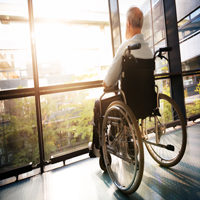Live 24/7 Call Answering: 609-881-1400

Physical abuse occurs when nurses or the staff in a nursing home intentionally inflict bodily harm on a patient. Slapping, hitting, punching, and rough handling can lead to serious injuries such as bone fractures, lacerations, bruising and swelling, or emotional trauma. Unreasonable physical restraint can also fall under this category of abuse. When restraints are used as a form of punishment or to keep a patient confined, it constitutes abuse.
Because many residents suffer from cognitive impairment and cannot advocate for themselves, abusive circumstances may not be clear to the family visits during visits. This is particularly true with verbal abuse. Verbal abuse is often in the form of name calling, use of obscenities, yelling, or verbal threats which only occur when staff members are alone with the patient. And while this type of abuse doesn’t leave physical marks, it does present very real emotional trauma and can lead to severe depression, anxiety, and combativeness.
Neglecting a resident’s physical, medical, or emotional needs can leave a person feeling isolated, in pain, or lead to medical complications, such as bed sores or malnourishment. Leaving patients to sit in soiled diapers for prolonged periods of time deprives them of basic dignity, and can result in skin breakdown, infections and other serious complications. Patients who are routinely left alone in their room without visitors or interaction with staff or doctors can suffer a serious decline in their cognitive and mental abilities. Residents should be moved out of their rooms during the day to take advantage of social interactions available in daily activities whenever possible.
Sexual abuse of nursing home residents is one of the most shocking and traumatic forms of abuse. Molestation, rape, or unwanted sexual advances or comments can leave patients depressed, fearful, and emotionally or physically traumatized. Patients often fear retaliation if they report the abuse, or are apprehensive because they are afraid that their claims may not be taken seriously. Victims can contract sexually transmitted diseases or suffer physical and mental injury.
Any sign of physical harm, such as cuts, bruises, unexplained swelling, or broken bones, needs to be reported and investigated immediately. Documentation, along with pictures of the injuries, need to be kept in the patient’s file so that patterns of abuse may be identified. There will also be an investigation report or incident report the facility may ore may not provide to the family. If they refuse, ask why. Family members need to be persistent in their demand for answers and diligent in checking for signs of continued abuse.
Dehydration, malnourishment, unexplained weight loss, or bed sores are often signs of neglect. Many nursing homes are understaffed, which can cause many of these issues and problems. It is the responsibility of the nursing home facility to ensure that there is enough staff on hand to attend to the needs of all patients. Failure to provide these basic services should be reported immediately with demands for a full investigation.
Sudden fearfulness or requests from patients to not have a certain nurse or staff member present can be a warning sign that they are suffering physical, emotional, verbal, or sexual abuse. Many residents hesitate to speak up and specifically identify a person and their actions for fear of retribution. As such, it is imperative for family members and staff to pay close attention to sudden changes in behavior or personality. Depression, anxiety, withdraw from social interactions, refusal to eat, or unusual quietness can be warning signs of emotional trauma.